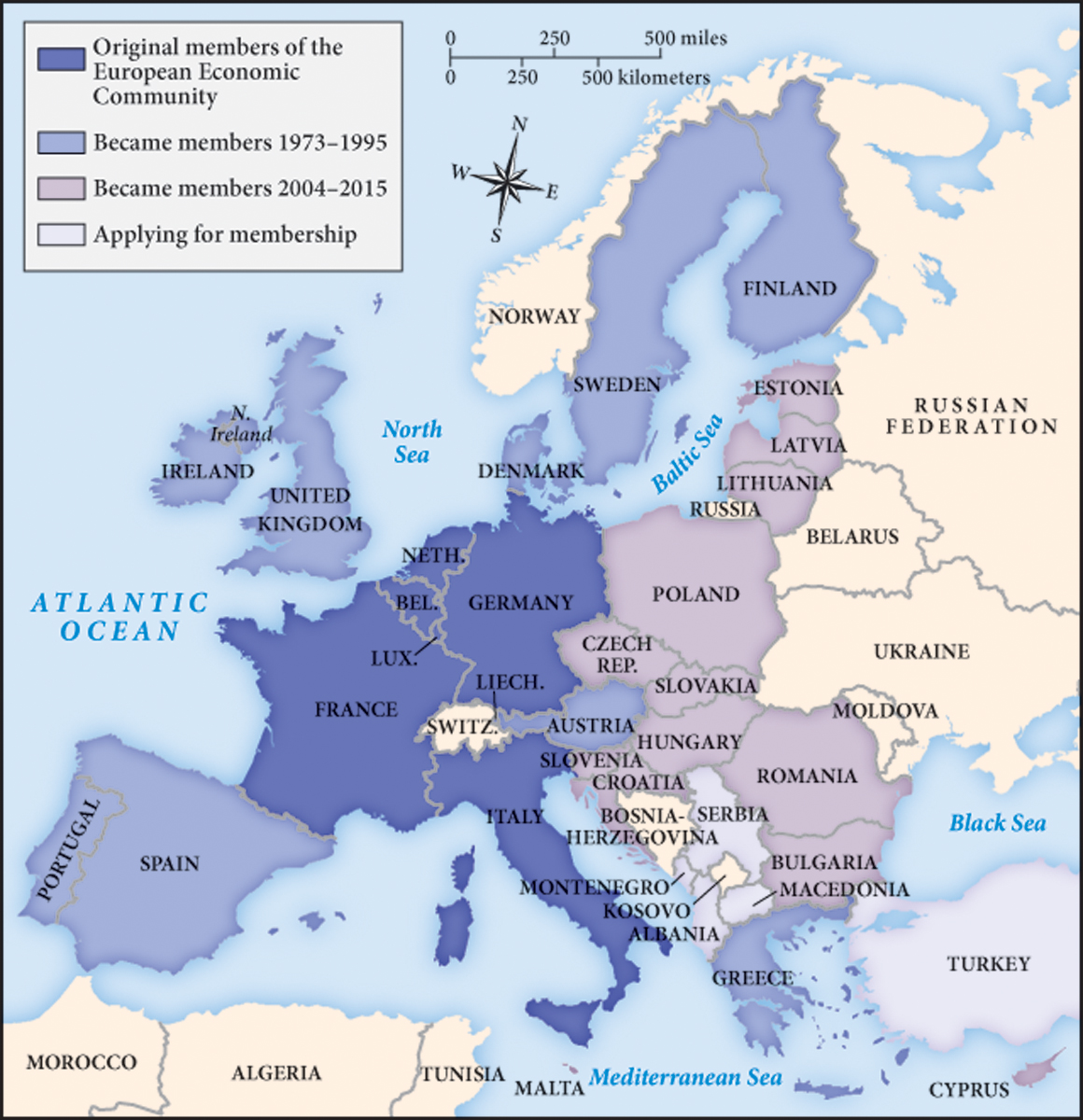Europe Looks beyond the Nation-State
Europe Looks beyond the Nation-State
The Common Market changed dramatically after the demise of European communism. In 1992, the twelve countries of the Common Market ended national distinctions in certain business activities, border controls, and transportation, effectively closing down passport controls at their shared borders. Citizens of the member countries carried a uniform burgundy-colored passport, and governments, whether municipal or national, had to treat all member nations’ firms the same. In 1994, by the terms of the Maastricht Treaty, the European Community became the European Union (EU), and in 1999 a common currency—the euro—came into being, first for transactions among financial institutions and then in 2002 for general use by the public. Common policies governed everything from the number of American soap operas aired on television to pollution controls on automobiles to the health warnings on cigarette packages. The EU parliament convened regularly in Strasbourg, France, and with the adoption of a common currency, an EU central bank guided interest rates and economic policy.
The EU was seen as the key to a peaceful Europe. “People with the same money don’t go to war with one another,” said a French nuclear scientist about the introduction of the euro. Greece pushed for the admission of its traditional enemy Turkey in 2002 and 2003 despite the warnings of a former president of France that a predominantly Muslim country could never fit in with the Christian traditions of EU members. Both Greece and Turkey stood to benefit by having their disputes adjudicated by the larger body of European members, principally because they would be able to cut that part of their defense budget used for weapons directed against each other. Like the rivalry between Germany and France, that between Turkey and Greece, it was hoped, would dissolve if bound by the strong economic and political ties of the EU. As of 2015, however, Turkey still awaited progress on its application while beginning to edge away from Europe.
There were drawbacks to EU membership. The EU enforced no common regulatory practices, and individual governments did not always observe common economic policies such as limits on budget deficits. Individual governments also, on occasion, set up hurdles and barriers for businesses, for example obstructing transnational mergers they did not like or blocking the acquisition of a company based on its own soil no matter what the advantages to shareholders, the economy, the workforce, or the consumers of unified Europe. Nonetheless, countries of eastern Europe clamored to join, working hard to meet not only the EU’s fiscal requirements but also those pertaining to human rights and social policy (Map 29.3).

The collapse of the Soviet system advanced privatization of eastern European industry, and governments sold basic services to the highest bidder. Often, companies in the wealthy western countries of the EU snapped up eastern European assets. For example, the Czech Republic in 2001 sold its major energy distributor, Transgaz, and eight other regional distributors for 4.1 billion euros to a German firm. Lower wages and costs of doing business in eastern Europe attracted foreign investment, especially to Poland, the Czech Republic, Hungary, and Slovenia—the most developed state spun off from Yugoslavia. Eastern European countries sought membership to gain further investment, advance modernization, and protect their economies. (See “Document 29.1: Václav Havel, ‘Czechoslovakia Is Returning to Europe.’”)
In 2004, the EU admitted ten new members—the Czech Republic, Cyprus, Estonia, Hungary, Latvia, Lithuania, Malta, Poland, Slovakia, and Slovenia—and in 2007 it welcomed Bulgaria and Romania. Just before its admission to the EU, Poland’s standard of living was 39 percent of EU standards, up from 33 percent in 1995. The Czech Republic and Hungary were at 55 and 50 percent, respectively. In all three cases these figures masked the discrepancy between the ailing countryside and thriving cities. Citizens in eastern Europe were not always happy at joining the EU. A retiree foresaw the cost of beer going up and added, “If I wanted to join anything in the West, I would have defected.” Still others felt that having just established an independent national identity, they should not allow themselves to be swallowed up once again. People in older member states were having second thoughts, too: in the spring of 2005, a majority of voters in France and the Netherlands rejected a complex draft constitution that would have strengthened EU ties. Commentators attributed the rejection to popular anger at the EU bureaucracy’s failure to consult ordinary people in decision making.
Although still weak by comparison with most of western Europe, the economic life of eastern Europe had in fact picked up considerably by 2000. In contrast to the massive layoffs, soaring inflation, and unpaid salaries of the first post-Communist years, in 2002 residents of Poland, Slovenia, and Estonia had purchasing power some 40 percent higher than in 1989. Outsourcing by international companies began to flourish across the region, increasing opportunities for those with language and commercial skills. Even in countries with the weakest economies—Latvia, Bulgaria, and Romania—a greater number of residents enjoyed such modern conveniences as freezers, computers, and portable telephones. Shopping malls sprang up, mostly around capital cities, and superstores like the furniture giant IKEA and the electronics firm Electroworld became a consumer’s paradise to those long starved of goods. “When Electroworld opened in Budapest [April 2002], it provoked a riot. Two hundred thousand people crowded to get in the doors,” reported one amazed observer, a sign of U.S.-style “consumania” of materialism and frenzied shopping. For consumers, however, learning to read labels and to compare prices offered by superstores indicated their membership in a free, global community. Many proudly believed they had left communist poverty behind.